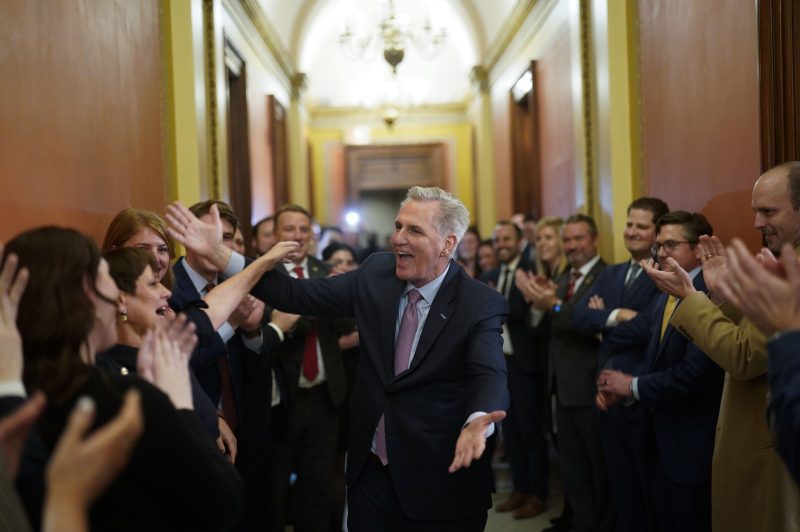After two full days and six rounds of voting, with 21 Republican holdouts blocking Kevin McCarthy’s long-held dream of becoming speaker of the House, the 57-year-old from Bakersfield, Calif., gathered a small group of lawmakers to hear his final pitch.
Huddled in the office of Majority Whip Tom Emmers (R-Minn.), McCarthy told the three moderates and four holdouts that his offer was to become the 55th speaker by significantly weakening the position and empowering his party’s hard-liners.
The meeting, according to people present and briefed, became a turning point in breaking the impasse as much for the terms of the deal as for how it reestablished trust between the two factions. The small group was selected for those who’d shown good faith in weeks of negotiations, and turned into what was described as a “therapy” session. The holdouts explained that McCarthy had offended them by rejecting their wish list of committee assignments after he’d been the one to ask for it, and for delivering a fiery speech to the Republican conference saying he’d “earned” the job. The moderates, in turn, gained assurances that the concessions to the hard-liners weren’t unreasonable and wouldn’t be abused.
“The moment I knew it was going to be his is when we got it down to a handful of members that Kevin could work personally,” Rep. Patrick T. McHenry (R-N.C.), a close McCarthy ally, said early Saturday. “The crux of all the movement was around assurances, trust-building assurances. That was massive. Massive. Which leads to functionality, which leads to conservative policy.”
The Wednesday night meeting became the basis for a framework agreement hammered out over two more days and six more rounds of voting. Months of posturing and saber-rattling at last gave way to serious talks on changing how the new House would operate, with a special focus on passing spending bills.
What emerged was a deal that would secure McCarthy his prize only by diminishing it — and putting the House on a collision course for more crises like the one just barely resolved, next time over funding the government or raising the debt limit.
“It just reminds me of what my father always told me: It’s not how you start, it’s how you finish,” McCarthy told reporters in the Capitol on Friday. “Getting together and finding the ability to, ‘How’re we all gonna work together’ — it’s new for us, being in the majority, but being in a tight majority.”
This account of how House Republicans spun themselves into and out of the days-long stalemate over the speakership is based on interviews with dozens of lawmakers, aides and outside confidants, many of whom spoke on the condition of anonymity to reveal private deliberations.
‘Governing majority’ or ‘cartel’
In his office, McCarthy kept a large celebratory wine bottle from the last time Republicans won the majority and talked extensively about his plans as speaker — along with stacks of polling in various districts to show how he’d get the votes.
Two months ago, on election night, McCarthy and top lieutenants staged a victory party at a hotel ballroom in Washington, with a backdrop blaring “TAKE BACK THE HOUSE.” McCarthy huddled backstage with advisers — including lobbyist Jeff Miller, strategist Mike Shields and political aide Brian Jack, as well as Republican National Committee chairwoman Ronna McDaniel — receiving continuous updates about early returns.
McCarthy and close allies had raised and routed millions toward winning the House, but also shaping the incoming class of Republicans. Their goal was winning not just a majority but a “governing majority,” meaning a conference that would reliably support McCarthy and pass legislation. In some cases, that meant quiet moves by allies and donors to swing primaries away from controversial candidates such as Madison Cawthorn in North Carolina and Joe Kent in Washington State.
Republicans were widely expecting a rout in competitive House seats to rival the tea party wave of 2010. But the early reports to McCarthy’s team weren’t showing a red wave. They spent hours debating what to do, when McCarthy should take the podium to speak. He didn’t go on until 2 a.m.
Just as it was dawning on McCarthy’s team that instead of a governing majority they would have to contend with a narrow margin and an emboldened roster of “Make America Great Again” members, McCarthy’s detractors were realizing the same thing. The lack of an overwhelming win began to produce doubt from several anti-McCarthy Republicans like Rep. Andy Biggs (Ariz.) and Matt Gaetz (Fla.) that he could become speaker.
“Everyone thought it was going to be a Republican wave, and to the extent that it wasn’t, you have a fundamentally different opportunity,” said Russ Vought, a former head of the White House budget office during the Trump administration who now leads a conservative nonprofit, Center for Renewing America. The group began convening weekly conference calls with thousands of activists around the country, advising them on how to pressure their members of Congress to oppose McCarthy for speaker.
The case, as Vought would articulate it, was against the “cartel” — his term for how Republican and Democratic leaders in Congress have privately negotiated massive, must-pass spending bills with little to no input from rank-and-file lawmakers. “Until you fix that, and give the procedural control a check with conservatives, you’re going to have business as usual with the cartel,” Vought said.
The House Freedom Caucus, comprising the chamber’s most far-right members, repeatedly approached McCarthy before the election about changing this procedure, according to the group’s chairman, Scott Perry. He said McCarthy rebuffed him in the summer and fall, and only engaged with the bloc after the election results made clear he would need their votes to become speaker.
Ahead of a closed-door leadership election in mid-November, Biggs said he would challenge McCarthy for the speakership. According to people familiar with the Freedom Caucus’s planning, Biggs ran to take away the excuse that lawmakers had to support McCarthy because there was no alternative. McCarthy won overwhelmingly, 188-31, but short of the 218 he’d need to become speaker, meaning he’d have to convince more Republicans to back him.
‘The five families’
When the House returned from Thanksgiving break, McCarthy expanded his usual weekly meeting with chairs of the ideological factions to include more members who were telegraphing they would likely make his pathway to the speakership difficult. Roughly 20 members stayed in McCarthy’s office for hours, discussing the viewpoints of each group to find common goals, even though the pathway to reach it could get tricky.
Reps. Jim Jordan (R-Ohio) and Marjorie Taylor Greene (R-Ga.) both described the meeting as a “breakthrough” because key lawmakers were finally talking to each other about the future. But moderates, like Rep. Don Bacon (R-Neb.), tempered the optimism as a “good start.”
Members began to meet with more regularity through December and began to jokingly refer to it as the “meeting of the five families,” a reference to the mafia summit in the movie “The Godfather.” During these meetings it became clear that a group of key lawmakers were showing good faith efforts to represent their factions and negotiate: Brian Fitzpatrick (Pa.), Dusty Johnson (S.D.), Dave Joyce (Ohio), Chip Roy (Texas) and Scott Perry (Pa.). The first three were tapped by McCarthy to act as his liaisons with the holdouts.
The meetings coincided with the lame duck session in December, when congressional leaders pushed through a $1.7 trillion spending bill — exactly the type of “cartel” legislating that Freedom Caucus members were railing against.
By Perry’s account, the Freedom Caucus wanted to hear McCarthy’s vision to earn their vote, but McCarthy kept asking them what they wanted. So the group put their ideas in writing in early December, proposing to let them force a vote on removing the speaker — known as a motion to vacate — put conservatives on the powerful Rules Committee, limit spending, impanel a committee to investigate “weaponized government” and barring leadership from playing in primaries.
In a nod to the Freedom Caucus, McCarthy held multiple full-conference sessions to let members advocate for their proposals ahead of the formal vote on the rules. The full body of Republicans considered and rejected several of the Freedom Caucus’s demands, including the motion to vacate, which most Republicans feared would hamstring McCarthy.
McCarthy’s allies worked around Christmas to hear out the holdouts and understand their arguments. It also became an explanation of sorts, according to lawmakers familiar with the talks, as they urged the Freedom Caucus holdouts to understand the ramifications of some of their requests and that there would be no way that anyone else in the conference would be elected speaker. Throughout December, moderates had privately pledged they would never support another candidate, even well-liked second-ranking Rep. Steve Scalise (R-La.), because they did not want to set the precedent that a small faction could determine the fate of one aspiring leader and the will of the conference.
By the Friday before New Year’s Eve, McCarthy held a call with his key allies to tell them that he was ready to offer some concessions in an effort to peel some members over to his camp. Shockingly, he reversed his pledge to never amend the motion to vacate rule. The rule was rewritten by then-House Speaker Nancy Pelosi (D-Calif.) after witnessing how the Freedom Caucus used the previous version — allowing any single member to propose ousting the speaker — to jeopardize the speakerships of John A. Boehner (R-Ohio) and Paul D. Ryan’s (R-Wis.).
McCarthy conceded to change the rule to say five members could move to oust him — a concession that rattled moderates who pledged against supporting any rules package that amended that motion.
On a Sunday conference call, McCarthy officially released the rules package for all Republicans to review — including the five-member motion to vacate, measures to cut spending and a committee to investigate the “weaponization of government against our citizens.” While the concessions rattled moderates and institutionalists, McCarthy supporters (known as the “Only Kevin” group) accepted the motion to vacate demand if it would ensure McCarthy became speaker. When pressed on that question, McCarthy avoided answering.
It turned out the concessions hadn’t satisfied them. In a scathing letter on New Year’s Day, Freedom Caucus members slammed McCarthy’s proposal as lacking the “means to measure whether promises are kept or broken.” His offer of allowing rank-and-file amendments to budget bills contained an escape hatch for the Rules Committee, under the speaker’s control, to waive the process. And his version of the investigative committee lacked the jurisdiction and powers that the Freedom Caucus wanted, which was something modeled after the 1975 Senate “Church committee” that investigated the federal government after Watergate. Some members were insulted that McCarthy seemed to be playing them for dumb, as if they wouldn’t read the fine print.
The letter also faulted McCarthy for failing to address the complaint about leadership involvement in primaries.
“Every member I talk to has said in every conversation with McCarthy, he had made his road much harder,” Vought said. “The arrogance of it, the inability to recognize your colleague’s interest, the ongoing way that leadership tries to mansplain to rank-and-file members that they actually have done what they have not done and expecting them not to pick up on it — that’s the kind of thing that is infuriating.”
McCarthy pledged in a letter sent to colleagues to “work with everyone in our party to build conservative consensus,” but he stressed the need for the conference to unite around a proposed rules package that would dictate how the House governs over the next two years.
“It’s time for our new Republican majority to embrace these bold reforms and move forward as one,” McCarthy wrote. “That’s why on January 3 — and every day thereafter — I stand ready to be judged not by my words, but by my actions as Speaker.”
The spirit of 1923
On Monday, as lawmakers began to arrive in Washington, McCarthy met with all key lawmakers across the ideological spectrum to walk through what to expect Tuesday. No breakthrough occurred, as the holdouts emerged reiterating to reporters that they were still against his candidacy.
McCarthy and his allies knew by Monday evening that he would fail on the floor Tuesday shortly after noon, gaining the title of the first candidate for speaker to lose on the first ballot in 100 years.
McCarthy allies believed that his aggressive speech on Tuesday morning — calling out his detractors as unreasonable and selfish before voting began — had the dual effect of solidifying his existing support and making it harder to strike an early deal to make him speaker. Mike Rogers (R-Ala.) rose in the same meeting to warn that McCarthy detractors should be kicked off their committee assignments if they oppose his speaker bid.
“That was unhelpful,” said one Republican involved in the process. “That has become one of the central things that has put them in a corner. It wasn’t McCarthy saying it.”
Moving into the speaker’s office before a vote was also meant to show confidence, but some close to him fear it backfired.
After the initial losses on the House floor, McCarthy’s team focused on trying to split his opposition, peeling those focused on changing House rules away from those who had a more personal vendetta against his speakership. “The whole key for us is getting the true malcontents on an island. If they are on an island, we can work with this,” the Republican said.
McCarthy’s team was also encouraged by the support that he was receiving from conservative media. A failed McCarthy bid for the speakership in 2015 was undone in part by an appearance he made on Sean Hannity’s Fox News program, where he admitted to the political motivations behind the Benghazi Special Committee. On Wednesday night, Hannity delivered a harsh grilling of one key holdout, Lauren Boebert of Colorado. Tucker Carlson, though, appeared sympathetic to the defectors and their demands.
From the beginning, the holdouts planned to defeat McCarthy first and only then discuss alternatives, since any individual challenger would be present more complications than the generic “not McCarthy.” Starting with Biggs and Jordan, in later rounds of balloting they switched their votes to other more consensus-oriented nominees in the hope of attracting more defectors.
But other Republicans didn’t see the method behind the madness, instead viewing the vote-switching as the absence of any plan, which made them more and more frustrated. Some members further alienated the holdouts with media interviews comparing them to terrorists or the Taliban.
“You put us through multiple votes unnecessarily, we all know it,” Dan Crenshaw of Texas, who had said the holdouts were acting like “terrorists” and “children,” told reporters late Friday. “I continue to be frustrated we had to go through this just to get to a point where we already liked.”
Wednesday night therapy
McCarthy repeatedly tried to strike an optimistic tone, telling former president Donald Trump, McDaniel and others that he was going to win, even as some of Trump’s advisers became increasingly skeptical. At one point, Trump told lawmakers he wanted them to sit down with McCarthy and make a deal and even orchestrated a talk between McCarthy and Scott Perry (Pa.) — trying to get Perry to vote for McCarthy.
McCarthy adviser Brian Jack at times suggested people Trump should speak to, but Trump’s calls were not the key reason many of the defectors changed course, people familiar with the matter said.
“He would call some of these guys and they’d listen but wouldn’t make any commitments,” one Trump adviser said. “It’s a combination of a couple things: Conservatives are hungry for a win, and true believers are going to stick to their guns.”
McCarthy stayed positive even as late as Wednesday night, people who spoke to him said, asking for patience and saying he would get the votes.
The first step toward a resolution came from the outside, when David McIntosh, head of the conservative Club for Growth super PAC, approached Dan Conston, the head of the McCarthy-aligned Congressional Leadership Fund. McIntosh had heard through an intermediary that Conston would be open to a deal to address lawmakers’ complaints about leadership involvement in primaries, according to a person familiar with the talks.
That night they announced a commitment for CLF to stay out of open primaries in safe red seats. While the terms were porous — it would have applied to only one race in the 2022 cycle, not the intervention that most offended Freedom Caucus members — it was a mark of progress on one of the bloc’s key grievances.
Around the same time, the select group of moderates and conservatives gathered in Emmer’s office for what became the therapy session. Those in the room with McCarthy, Emmer, and Jim Jordan (Ohio) were Brian Fitzpatrick (Pa.), David Joyce (Ohio), and Dusty Johnson (N.D.) representing the pragmatic wing, and Chip Roy (Texas), Scott Perry (Pa.), Byron Donalds (Fla.) and briefly Ralph Norman (S.C.) from the holdouts. Matt Gaetz (Fla.) and Lauren Boebert (Colo.) were not invited to the gathering but showed up before they were ushered into another room in Emmer’s large office wing.
Members recounted how they had reached such a standoff after emotions ran high earlier in the week.
Holdouts also expressed that they were offended by how McCarthy — in a Monday evening meeting — had rejected the list of committee assignments they handed over after the leader-in-waiting had asked them for it weeks before. McCarthy then gave a fiery speech to the conference Tuesday morning where he said he had “earned” the speakership and would no longer relent to the holdouts “personal wish list,” in reference to the committee list. His response, they said, tarnished the good faith negotiations between those in the room.
Past apologies and renewing commitments to trust each other, McCarthy made his pitch, offering to lower the motion to vacate threshold from five to one member, which would option the option for the full House to oust him. He also pledged to put more members of the Freedom Caucus on the influential Rules Committee, allow a vote on instituting a 12-year term limit on members and other proposals that addressed fiscal concerns.
Moderates had pledged they would never support a one-vote motion to vacate, and knew that such a proposal would mean going back to the scores of “Only Kevin” colleagues to win them over.
To ease their concerns, the holdouts pledged that they would not misuse the motion, stressing that it made no sense for them to recall a speaker if doing so would interrupt the Judiciary Committee’s planned investigations into the Biden administration or during the 2024 presidential election campaign.
And to ensure that holdouts would not abuse it, moderates threatened their own motion — they could band with Democrats on bipartisan legislation to “discharge” any legislation stuck in committees to bring and pass bills on the floor.
The sum of the changes would be for McCarthy to accept the hard-liners’ demand to clamp down on government spending and give them the procedural tools to hold him to that promise.
“We got everything we wanted in terms of a paradigm shift in the House of Representatives,” Vought said. “Setting up various fights on the budget and debt limit, the Church-style committee — these are all the things we were pushing. This 20 is now its own coalition in the House. They were able to stick together through thick and thin and hold out for significant reforms. They showed the extent to which a muscular approach to these leverage points are vital.”
While the lawmakers agreed in principle, they knew it would take time to convince all their colleagues of such changes. First, some holdouts would flip their votes to McCarthy as a good-faith gesture to show progress, then they would zero in on pressuring the remaining opponents to clear the way. It could mean McCarthy lose more rounds of ballots so that members could stay on the floor, negotiate, and clarify details in real time to officially cut a deal.
“We’re going to make progress,” McCarthy told reporters while entering the Capitol on Friday morning, after more negotiations to hammer out the details. “We’re going to shock you.”
McCarthy’s foreshadowing came true — 14 of the 21 holdouts had switched their votes to McCarthy by the first vote Friday morning, overperforming expectations by Emmer’s whip team and McCarthy allies who projected Thursday at most 11 could flip. Andy Harris (R-Md.) shocked even more as he flipped to McCarthy during the second round of ballots Friday, leaving six holdouts to win over.
Republicans adjourned in the afternoon until 10 p.m. Friday to give them plenty of hours to pressure the remaining holdouts into flipping and allow two McCarthy allies to return in time to help his math by casting their supportive vote.
‘How you finish’
When the House reconvened for the 14th ballot, everything indicated that McCarthy and his team thought this was the one. His wife, family members and friends were watching in the gallery’s VIP suites. McCarthy himself, when it was nearing his turn to vote, put down his phone, buttoned his jacket and straightened it, as if anticipating a dramatic moment. When the clerk called him, he stood up from his chair and proudly declared, “McCarthy!”
All eyes turned to Gaetz, the first and most outspoken of the holdouts. The Florida congressman’s brash style had long made him divisive within the Republican conference, and his campaign was sending fundraising emails declaring “McCarthy will never get my vote for Speaker” that continued into Saturday. When Gaetz voted present, some Republicans broke into applause and high fives, thinking it was enough to deliver McCarthy’s majority.
But McCarthy and his top lieutenants signaled for them to hold off on celebrating — something was wrong. He was still one vote short. With the whole chamber watching, McCarthy walked up the aisle to Gaetz’s seat and pleaded with him to switch his vote before the clerk closed out the proceeding.
As McCarthy stepped away, dejected, Rogers started yelling at Gaetz and had to be restrained by his colleagues. His anger arose from an offer floated by GOP leadership that would have given Gaetz the gavel of one of Rogers’ Armed Services subcommittees, according to two people familiar with the dynamics. (Rogers later declined to comment on the offer, and McCarthy said no promises were made.)
McHenry moved to adjourn until Monday, giving time to negotiate with the last six holdouts. But then Gaetz and Boebert moved toward the well and signaled they opposed adjourning. Gaetz, Biggs and others got calls from Trump, saying this needed to be resolved. (Greene was also photographed holding up her phone whose screen said “DT” and offering it to Rosendale, who refused to take the call.)
“Just make a deal” was Trump’s message for days, according several people familiar with his calls to lawmakers. He didn’t understand why some members were so opposed and he was not particularly interested in the particulars. “It’s a bad look for everybody,” he said to at least one member about the days-long fight.
Speaking to reporters afterward, McCarthy was effusive in thanking Trump, who backed him for speaker after McCarthy helped rescue Trump by visiting him at Mar-a-Lago in the aftermath of the Jan. 6, 2021, insurrection. “I don’t think anybody should doubt his influence,” McCarthy said early Saturday. “I was just talking to him tonight, helping get those final votes.”
“Let’s vote again, I’ll vote for you now,” Gaetz said on the floor.
McCarthy worked furiously to try to convince exhausted Republicans, who were promised a weekend, to change their vote. For the first time, McCarthy allies grew visibly angry at him and doubted whether one more vote was worth it after balloting 14 times over four days with no resolution.
“This is ridiculous,” Rep. Andrew R. Garbarino (R-N.Y.) shouted in McCarthy’s face in objection to switching his vote against adjourning. “I want to go home!”
But once Republicans began to realize the 15th vote would be the last one, they flooded the well to change their votes as they shouted, “One more time!”
In the end, an affirmative vote from Gaetz wasn’t needed, as all six remaining holdouts switched their vote to present after following Biggs’s lead.
“We just didn’t have numbers anymore,” Biggs said about why the six dropped their objections
Eli Crane — an Arizona freshman who two people close to him said had dug into his opposition after feeling threatened by a McCarthy aide — cast his final vote as “present” then stormed off the floor, saying, “I’m going home.”
The chamber broke into applause. Greene hugged McCarthy and took a selfie with Jordan. The clerk announced, “Kevin McCarthy, the dully elected speaker of the House,” and the 57-year-old from Bakersfield cried, “YES!”
Dylan Wells, Jacqueline Alemany, Theodoric Meyer and Paul Kane contributed to this report.



























